- Home
- Nicholas Sparks
The Wedding Page 2
The Wedding Read online
Page 2
Currently, Anna is working for the Raleigh News and Observer, but I think she has dreams of becoming a novelist. In college she majored in creative writing, and the stories she wrote were as dark as her personality. I recall reading one in which a young girl becomes a prostitute to care for her sick father, a man who'd once molested her. When I set the pages down, I wondered what I was supposed to make of such a thing.
She is also madly in love. Anna, always careful and deliberate in her choices, was highly selective when it came to men, and thankfully Keith has always struck me as someone who treats her well. He intends to be an orthopedist and carries himself with a confidence that comes only to those who've faced few setbacks in life. I learned through Jane that for their first date Keith took Anna kite flying on the beach near Fort Macon. Later that week, when Anna brought him by the house, Keith came dressed in a sports coat, freshly showered and smelling faintly of cologne. As we shook hands, he held my gaze and impressed me by saying, "It's a pleasure to meet you, Mr. Lewis."
Joseph, our second-born, is a year younger than Anna. He's always called me "Pop," though no one else in our family has ever used that term, and again, we have little in common. He's taller and thinner than I, wears jeans to most social functions, and when he visits at Thanksgiving or Christmas, he eats only vegetables. While he was growing up, I thought him quiet, yet his reticence, like Anna's, seemed directed at me in particular. Others often remarked on his sense of humor, though to be honest, I seldom saw it. Whenever we spent time together, I often felt as if he were trying to form an impression of me.
Like Jane, he was empathetic even as a child. He chewed his fingernails worrying about others, and they've been nothing but nubs since he was five years old. Needless to say, when I suggested that he consider majoring in business or economics, he ignored my advice and chose sociology. He now works for a battered women's shelter in New York City, though he tells us nothing more about his job. I know he wonders about the choices I've made in my life, just as I wonder about his, yet despite our differences, it's with Joseph that I have the conversations that I always wished to have with my children when I held them as infants. He is highly intelligent; he received a near perfect score on his SATs, and his interests span the spectrum from the history of Middle Eastern dhimmitude to theoretical applications of fractal geometry. He is also honest--sometimes painfully so--and it goes without saying that these aspects of his personality leave me at a disadvantage when it comes to debating him. Though I sometimes grow frustrated at his stubbornness, it's during such moments that I'm especially proud to call him my son.
Leslie, the baby of our family, is currently studying biology and physiology at Wake Forest with the intention of becoming a veterinarian. Instead of coming home during the summers like most students, she takes additional classes with the intention of graduating early and spends her afternoons working at a place called Animal Farm. Of all our children, she is the most gregarious, and her laughter sounds the same as Jane's. Like Anna, she liked to visit me in my den, though she was happiest when I gave her my full attention. As a youngster, she liked to sit in my lap and pull on my ears; as she grew older, she liked to wander in and share funny jokes. My shelves are covered with the gifts she made me growing up: plaster casts of her handprints, drawings in crayon, a necklace made from macaroni. She was the easiest to love, the first in line for hugs or kisses from the grandparents, and she took great pleasure in curling up on the couch and watching romantic movies. I was not surprised when she was named the homecoming queen at her high school three years ago.
She is kind as well. Everyone in her class was always invited to her birthday parties for fear of hurting someone's feelings, and when she was nine, she once spent an afternoon walking from towel to towel at the beach because she'd found a discarded watch in the surf and wanted to return it to its owner. Of all my children, she has always caused me the least worry, and when she comes to visit, I drop whatever I'm doing to spend time with her. Her energy is infectious, and when we're together, I wonder how it is I could have been so blessed.
Now that they've all moved out, our home has changed. Where music once blared, there is nothing but stillness; while our pantry once shelved eight different types of sugared cereal, there is now a single brand that promises extra fiber. The furniture hasn't changed in the bedrooms where our children slept, but because the posters and bulletin boards have been taken down--as well as all other reminders of their personalities--there is nothing to differentiate one room from the next. But it was the emptiness of the house that seemed to dominate now; while our home was perfect for a family of five, it suddenly struck me as a cavernous reminder of the way things ought to be. I remember hoping that this change in the household had something to do with the way Jane was feeling.
Still, regardless of the reason, I couldn't deny that we were drifting apart, and the more I thought about it, the more I noticed how wide the gap between us had become. We'd started out as a couple and been changed into parents--something I had always viewed as normal and inevitable--but after twenty-nine years, it was as if we'd become strangers again. Only habit seemed to be keeping us together. Our lives had little in common; we rose at different hours, spent our days in different places, and followed our own routines in the evenings. I knew little of her daily activities and admitted to keeping parts of mine secret as well. I couldn't recall the last time Jane and I had talked about anything unexpected.
Two weeks after the forgotten anniversary, however, Jane and I did just that.
"Wilson," she said, "we have to talk."
I looked up at her. A bottle of wine stood on the table between us, our meal nearly finished.
"Yes?"
"I was thinking," she said, "of heading up to New York to spend some time with Joseph."
"Won't he be here for the holidays?"
"That's not for a couple of months. And since he didn't make it home this summer, I thought it might be nice to visit him for a change."
In the back of my mind, I noted that it might do us some good as a couple to get away for a few days. Perhaps that had even been the reason for Jane's suggestion, and with a smile, I reached for my wineglass. "That's a good idea," I agreed. "We haven't been to New York since he first moved there."
Jane smiled briefly before lowering her gaze to her plate. "There's something else, too."
"Yes?"
"Well, it's just that you're pretty busy at work, and I know how hard it is for you to get away."
"I think I can clear up my schedule for a few days," I said, already mentally leafing through my work calendar. It would be tough, but I could do it. "When did you want to go?"
"Well, that's the thing . . . ," she said.
"What's the thing?"
"Wilson, please let me finish," she said. She drew a long breath, not bothering to hide the weariness in her tone. "What I was trying to say was that I think I might like to visit him by myself."
For a moment, I didn't know what to say.
"You're upset, aren't you," she said.
"No," I said quickly. "He's our son. How could I get upset about that?" To underscore my equanimity, I used my knife to cut another bite of meat. "So when were you thinking about heading up there?" I asked.
"Next week," she said. "On Thursday."
"Thursday?"
"I already have my ticket."
Though she wasn't quite finished with her meal, she rose and headed for the kitchen. By the way she avoided my gaze, I suspected she had something else to say but wasn't quite sure how to phrase it. A moment later, I was alone at the table. If I turned, I could just see her face in profile as she stood near the sink.
"Sounds like it'll be fun," I called out with what I hoped sounded like nonchalance. "And I know Joseph will enjoy it, too. Maybe there's a show or something that you could see while you're up there."
"Maybe," I heard her say. "I guess it depends on his schedule."
Hearing the faucet run, I rose from my seat and
brought my dishes to the sink. Jane said nothing as I approached.
"It should be a wonderful weekend," I added.
She reached for my plate and began to rinse.
"Oh, about that . . . ," she said.
"Yes?"
"I was thinking about staying up there for more than just the weekend."
At her words, I felt my shoulders tense. "How long are you planning to stay?" I asked.
She set my plate off to the side.
"A couple of weeks," she answered.
Of course, I didn't blame Jane for the path our marriage seemed to have taken. Somehow I knew I bore a greater portion of the responsibility, even if I hadn't yet put together all the pieces of why and how. For starters, I have to admit that I've never been quite the person my wife wanted me to be, even from the beginning of our marriage. I know, for instance, that she wished I were more romantic, the way her own father had been with her mother. Her father was the kind of man who would hold his wife's hand in the hours after dinner or spontaneously pick a bouquet of wildflowers on his way home from work. Even as a child, Jane was enthralled by her parents' romance. Over the years, I've heard her speaking with her sister Kate on the phone, wondering aloud why I seemed to find romance such a difficult concept. It isn't that I haven't made attempts, I just don't seem to have an understanding of what it takes to make another's heart start fluttering. Neither hugs nor kisses were common in the house where I'd grown up, and displaying affection often left me feeling uncomfortable, especially in the presence of my children. I talked to Jane's father about it once, and he suggested that I write a letter to my wife. "Tell her why you love her," he said, "and give specific reasons." This was twelve years ago. I remember trying to take his advice, but as my hand hovered over the paper, I couldn't seem to find the appropriate words. Eventually I put the pen aside. Unlike her father, I have never been comfortable discussing feelings. I'm steady, yes. Dependable, absolutely. Faithful, without a doubt. But romance, I hate to admit, is as foreign to me as giving birth.
I sometimes wonder how many other men are exactly like me.
While Jane was in New York, Joseph answered the phone when I called.
"Hey, Pop," he said simply.
"Hey," I said. "How are you?"
"Fine," he said. After what seemed like a painfully long moment, he asked, "And you?"
I shifted my weight from one foot to the other. "It's quiet around here, but I'm doing okay." I paused. "How's your mom's visit going?"
"It's fine. I've been keeping her busy."
"Shopping and sightseeing?"
"A little. Mainly we've been doing a lot of talking. It's been interesting."
I hesitated. Though I wondered what he meant, Joseph seemed to feel no need to elaborate. "Oh," I said, doing my best to keep my voice light. "Is she around?"
"Actually, she isn't. She ran out to the grocery store. She'll be back in a few minutes, though, if you want to call back."
"No, that's okay," I said. "Just let her know that I called. I should be around all night if she wants to give me a ring."
"Will do," he agreed. Then, after a moment: "Hey, Pop? I wanted to ask you something."
"Yes?"
"Did you really forget your anniversary?"
I took a long breath. "Yes," I said, "I did."
"How come?"
"I don't know," I said. "I remembered that it was coming, but when the day arrived, it just slipped my mind. I don't have an excuse."
"It hurt her feelings," he said.
"I know."
There was a moment of silence on the other end. "Do you understand why?" he finally asked.
Though I didn't answer Joseph's question, I thought I did.
Quite simply, Jane didn't want us to end up like the elderly couples we sometimes saw when dining out, couples that have always aroused our pity.
These couples are, I should make clear, usually polite to each other. The husband might pull out a chair or collect the jackets, the wife might suggest one of the specials. And when the waiter comes, they may punctuate each other's orders with the knowledge that has been gained over a lifetime--no salt on the eggs or extra butter on the toast, for instance.
But then, once the order is placed, not a word passes between them.
Instead, they sip their drinks and glance out the window, waiting silently for their food to arrive. Once it does, they might speak to the waiter for a moment--to request a refill of coffee, for instance--but they quickly retreat to their own worlds as soon as he departs. And throughout the meal, they will sit like strangers who happen to be sharing the same table, as if they believed that the enjoyment of each other's company was more effort than it was worth.
Perhaps this is an exaggeration on my part of what their lives are really like, but I've occasionally wondered what brought these couples to this point.
While Jane was in New York, however, I was suddenly struck by the notion that we might be heading there as well.
When I picked Jane up from the airport, I remember feeling strangely nervous. It was an odd feeling, and I was relieved to see a flicker of a smile as she walked through the gate and made her way toward me. When she was close, I reached for her carry-on.
"How was your trip?" I asked.
"It was good," she said. "I have no idea why Joseph likes living there so much. It's so busy and noisy all the time. I couldn't do it."
"Glad you're home, then?"
"Yes," she said. "I am. But I'm tired."
"I'll bet. Trips are always tiring."
For a moment, neither of us said anything. I moved her carry-on to my other hand. "How's Joseph doing?" I asked.
"He's good. I think he's put on a little weight since the last time he was here."
"Anything exciting going on with him that you didn't mention on the phone?"
"Not really," she said. "He works too much, but that's about it."
In her tone I heard a hint of sadness, one that I didn't quite understand. As I considered it, I saw a young couple with their arms around each other, hugging as if they hadn't seen each other in years.
"I'm glad you're home," I said.
She glanced at me, held my eyes, then slowly turned toward the luggage carousel. "I know you are."
This was our state of affairs one year ago.
I wish I could tell you that things improved in the weeks immediately following Jane's trip, but they did not. Instead, our life went on as it had before; we led our separate lives, and one unmemorable day passed into the next. Jane wasn't exactly angry with me, but she didn't seem happy, either, and try as I might, I was at a loss as to what to do about it. It seemed as though a wall of indifference had somehow been constructed between us without my being aware of it. By late autumn, three months after the forgotten anniversary, I'd become so worried about our relationship that I knew I had to talk to her father.
His name is Noah Calhoun, and if you knew him, you would understand why I went to see him that day. He and his wife, Allie, had moved to Creekside Extended Care Facility nearly eleven years earlier, in their forty-sixth year of marriage. Though they once shared a bed, Noah now sleeps alone, and I wasn't surprised when I found his room empty. Most days, when I went to visit him, he was seated on a bench near the pond, and I remember moving to the window to make sure he was there.
Even from a distance, I recognized him easily: the white tufts of hair lifting slightly in the wind, his stooped posture, the light blue cardigan sweater that Kate had recently knitted for him. He was eighty-seven years old, a widower with hands that had curled with arthritis, and his health was precarious. He carried a vial of nitroglycerin pills in his pocket and suffered from prostate cancer, but the doctors were more concerned with his mental state. They'd sat Jane and me down in the office a few years earlier and eyed us gravely. He's been suffering from delusions, they informed us, and the delusions seem to be getting worse. For my part, I wasn't so sure. I thought I knew him better than most people, and certainly bet
ter than the doctors. With the exception of Jane, he was my dearest friend, and when I saw his solitary figure, I couldn't help but ache for all that he had lost.
His own marriage had come to an end five years earlier, but cynics would say it had ended long before that. Allie suffered from Alzheimer's in the final years of her life, and I've come to believe it's an intrinsically evil disease. It's a slow unraveling of all that a person once was. What are we, after all, without our memories, without our dreams? Watching the progression was like watching a slow-motion picture of an inevitable tragedy. It was difficult for Jane and me to visit Allie; Jane wanted to remember her mother as she once was, and I never pressed her to go, for it was painful for me as well. For Noah, however, it was the hardest of all.
But that's another story.
Leaving his room, I made my way to the courtyard. The morning was cool, even for autumn. The leaves were brilliant in the slanting sunshine, and the air carried the faint scent of chimney smoke. This, I remembered, was Allie's favorite time of year, and I felt his loneliness as I approached. As usual, he was feeding the swan, and when I reached his side, I put a grocery bag on the ground. In it were three loaves of Wonder Bread. Noah always had me purchase the same items when I came to visit.
"Hello, Noah," I said. I knew I could call him "Dad," as Jane had with my father, but I've never felt comfortable with this and Noah has never seemed to mind.
At the sound of my voice, Noah turned his head.
"Hello, Wilson," he said. "Thanks for dropping by."
I rested a hand on his shoulder. "Are you doing okay?"
"Could be better," he said. Then, with a mischievous grin: "Could be worse, though, too."
These were the words we always exchanged in greeting. He patted the bench and I took a seat next to him. I stared out over the pond. Fallen leaves resembled a kaleidoscope as they floated on the surface of the water. The glassy surface mirrored the cloudless sky.

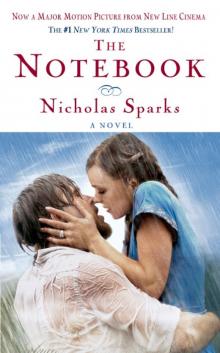 The Notebook
The Notebook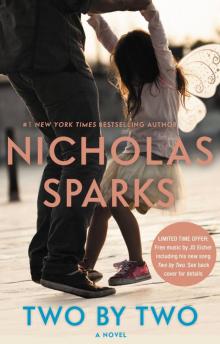 Two by Two
Two by Two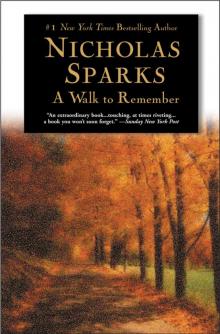 A Walk to Remember
A Walk to Remember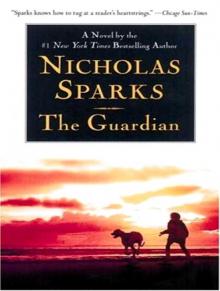 The Guardian
The Guardian Dear John
Dear John The Last Song
The Last Song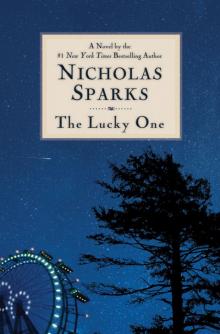 The Lucky One
The Lucky One The Wedding
The Wedding The Longest Ride
The Longest Ride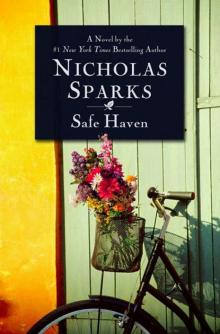 Safe Haven
Safe Haven The Rescue
The Rescue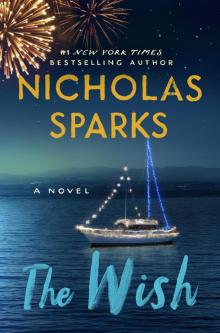 The Wish
The Wish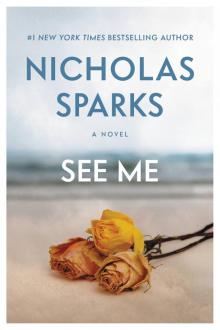 See Me
See Me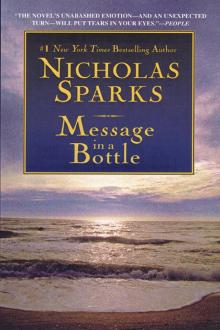 Message in a Bottle
Message in a Bottle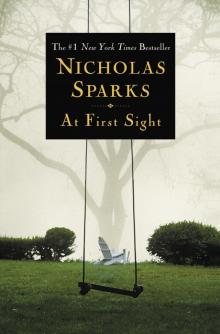 At First Sight
At First Sight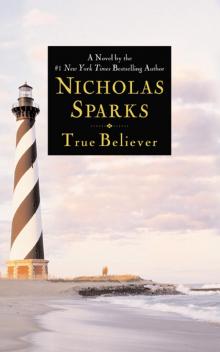 True Believer
True Believer The Return
The Return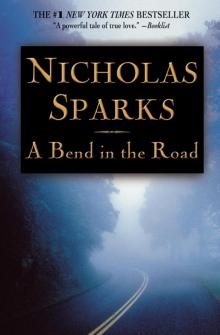 A Bend in the Road
A Bend in the Road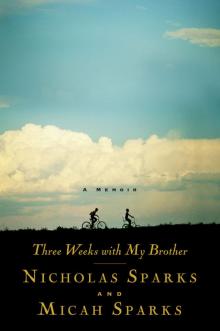 Three Weeks With My Brother
Three Weeks With My Brother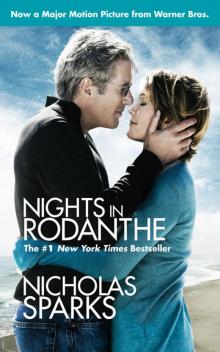 Nights in Rodanthe
Nights in Rodanthe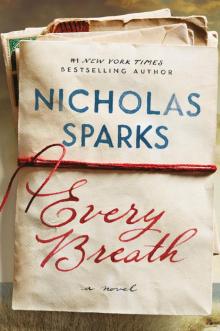 Every Breath
Every Breath